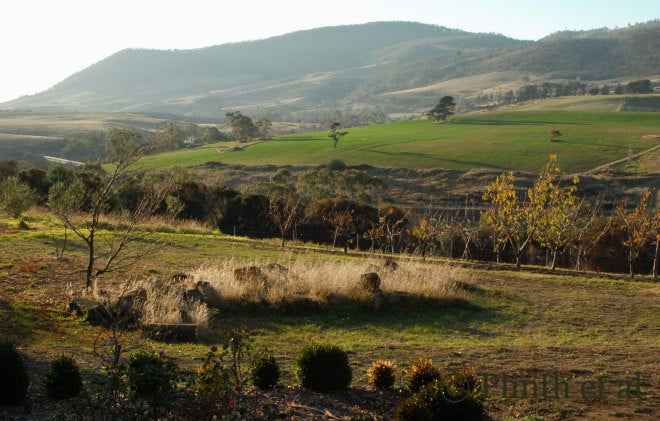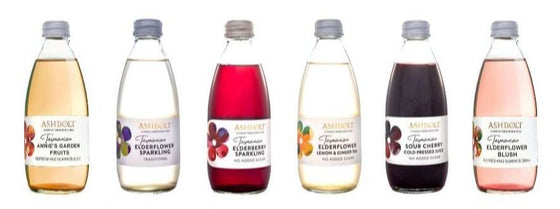Ashbolt Farm Tasmania - The Home of Australian Grown elderberries

Enjoy this 2014 extract from Plinth et Al, who visited our Farm during a Slow Food Open Day. It still rings true today and we are proud to feature in this beautiful expose of good food from around the world.
I have tasted olive oils of varying quality—from the low-grade, industrial ones sold cheaply in large tinned containers to the home-pressed one stored unflatteringly in a recycled Coca-Coca plastic bottle, but beautifully crafted by my Grecian friend’s family in Drama, Greece. I have had the back of my throat recoil and revolt from the acrid aftertaste of strongly herbaceous oils sold expensively on this boutique olive ranch one hour outside of San Francisco.
I was to experience what I regard as one of the best, if not sublime and unadulterated, example of premium olive oils in Australia. Galvanised by my housemate Kevin, Robert and Anne Ashbolt invited the public as part of the Slow Food Movement to assist with the annual harvest of olives from their young grove on their 375 hectare mixed farm in the scenic Derwent Valley. Sensing that the Australian market for premium olive oil was opening up, the Ashbolts decided to convert a portion of their hectares to olive trees in the late 1990s.
Like stellar winemakers who do not underestimate the significance of terroir in grapes, they chose their site carefully and visitors from Italy and Greece often remark how excellent their microclimate is for olive growing. After weeding out the ones that failed to thrive or produce in the cool-climate of Tasmania, the Ashbolts now grow ten varieties for their olive oil, which has regularly won medals at shows, such as the Wrest Point National Fine Foods and the Australian Olives Association (AOA) Awards, within the last six years.
Their recent purchase of an olive oil press has allowed more control over their product than when they had depended on an outside contractor to process their olives. Although the Ashbolts would like to propagate their own trees, their lack of time commitment and expertise necessitates purchasing young plants from the mainland. Frost has been their chief challenge for it damages the fruits and renders it useless for processing. Last year, a severe frost in mid June had wiped a large percentage of their crop. Anne half-jokingly remarked how she and the family scampered like rabid rabbits to recover any usable crop before another frost.
Robert kindly showed us how the olive oil press machine was operated. I was amused to see the waste product resembling gray feces, but it is scooped up to determine whether the press was running at the correct pace.

Left to right: Silvery sheen of olive leaves; Olives ready for harvesting; Olive Grove at Ashbolt Farm
Italian and Spanish olive oils may be held in high esteem in gastronomic circles, but Australian olive oils will soon and have rivalled them in quality. Anne has less than kind words for some of the European olive oils as she feels that they have been altered unscrupulously with preservatives, additives, and chemicals. For instance, some of the Greek olive oils have the unsavoury addition of sulphuric acid.
To draw out fruitiness of the oil, some dishonest producers may add sweeteners, which are easily disguised. Such adulteration is not practiced at the Ashbolt Farm—instead, the terroir of the farm is the key ingredient. The lack of consistent summer heat and warmth in Tasmania is outweighed by the cool winter temperatures and long summertime sunlight hours, as well as clean water and relatively unpolluted air.
The Ashbolt olive oil certainly reflects its terroir for it is of this vivid iridescent emerald-green, has a sweet and fruity, but complex nose that recalls rain-streaked vegetation and crisp apples, and seduces the mouth with a velvety texture underpinned with a slightly bitter and “hot” pungency. Because the production is of small scale, people often subscribe to secure the Ashbolt premium olive oil.
The oil is not cheap as it commands AU$100 per liter. One would not liberally douse their cooking pans with the Ashbolt premium olive oil, which is best appreciated in its raw state.

Left to right: Olives ripening on tree; Olive harvest; Olive oil – a vibrant green and rich in antioxidants and phenols
Curious about the olive harvest and processing for oil, I willingly went as an eager participant spending the better half of Sunday morning gingerly running my fingers through the branches and dispatching the olives, unripe and ripe, into the buckets.
There is a tactile, but comfortable pleasure in harvesting olives—you do not have to fend off hazardous prickles or thorns nor do you have to stoop your back painfully downwards. The fingers rub pleasingly against the lustrous silvery leaves and branches while distinguishing the plump oblong fruits, which sometimes release a whiff of the oleic acid if lightly bruised.
Yet there is an adult element for it is no child’s play to detach the olives from the tree. With ease, a child can pluck apples, pears, or large-bodied fruit from the tree, but would lack the ambidexterity or deftness for olives. Save for specially designed rakes, no pruning clippers are required.
Although machinery has supplanted human labor in commercial groves, harvesting the olives by hand allows you to step in the flow of history for ancient civilizations have long depended on the olive tree. The topography of the sloping Ashbolt Farm towards the mountains and Derwent River farther invites contemplation and contentment with life.

Growing, harvesting, and processing olives is a monumental undertaking, like any other agricultural ritual, as I recognized from the time spent picking all the olives from one tree. As the Ashbolts do not rely on machinery except for a truck to cart away the crates, harvesting by hand or hand-held rakes is a time-consuming activity.
Soil enrichment is via organic compost, seaweed fertilisers, and cover crops, water is pumped through efficient irrigation systems from the Derwent River, and strategically planted shelter belts mitigate the effects of wind. The Ashbolts would have easily adopted the conventional approaches, but their conscientious stewardship of their land eschews them and is truly reflected in their product. Forking AU$100 for their premium olive oil may be excessive, but it supports a sustainable farming business with clear, respectful goals.
It is no surprise that my housemate saw how the olive harvest would dovetail well with the goals of the Slow Food Movement. In Tree to Table: Cooking with Australian Olive Oil, Patricia Newell enthuses about the olive: “I love the fruit, the trees, the oil, even the word. You can play with it in the mind. O live. Try doing that with peanuts or canola.” I am inclined to agree for the Athenians chose wisely with the olive tree and will one day honor the mythical settlement with a potted olive oil or where hardy, a specimen outdoors.
For the full article, follow this link
https://plinthetal.wordpress.com/2014/02/19/olive-harvest-and-oil-in-tasmania/

